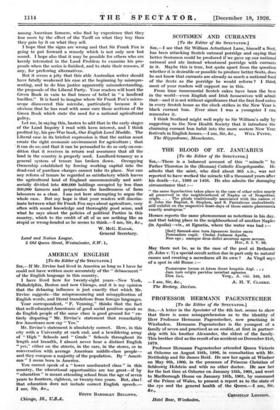AMERICAN ENGLISH [To the Editor of the SpEcrxron.]
Sra,—If Mr. Ervine had lived in America as long as I have he could not have written more accurately of the " debasement " of the English language in this country.
I have lived here for twenty-eight years—New York, Philadelphia, Boston and now Chicago, and it is my opinion that the debasing influence is just exactly that which Mr. Ervine suggests—the mispronouncing and misapplication of English words, and literal translations from foreign languages.
Your correspondent, " F. Venning," thinks that the fact that well-educated Americans of good social position speak as do English people of the same class is good ground for " en- tirely disputing " Mr. Ervine's statement that remarkably few Americans now say " Yes."
Mr. Ervine's statement is absolutely correct. Here, in this city with a University at each end, and a bewildering array of " High " Schools and " Grade " Schools throughout its length and breadth, I almost never hear a distinct English " yes," either on the streets, in the cars, in the stores, or in conversation with average American middle-class people— and they compose a majority of the population. By " Ameri- can " I mean born in America.
You cannot speak of a " lower uneducated class " in this country, the educational opportunities are too great—if by " education " is meant attending school from the age of seven years to fourteen, eighteen, or twenty-two years. But, alas ! that education does not include correct English speech.— I am, Sir, &c.,
Chicago, III., U.S.A. EDITH BARDSLEY BELLOWS.










































 Previous page
Previous page